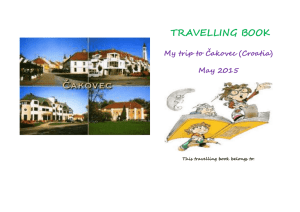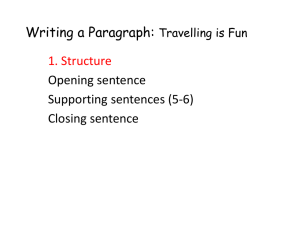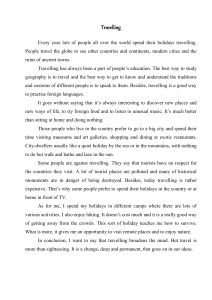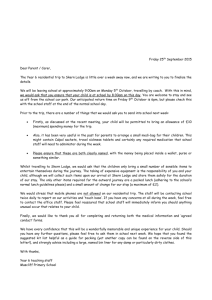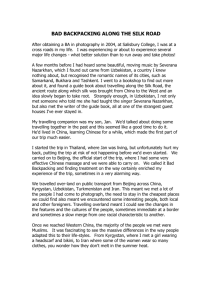Travelling
advertisement
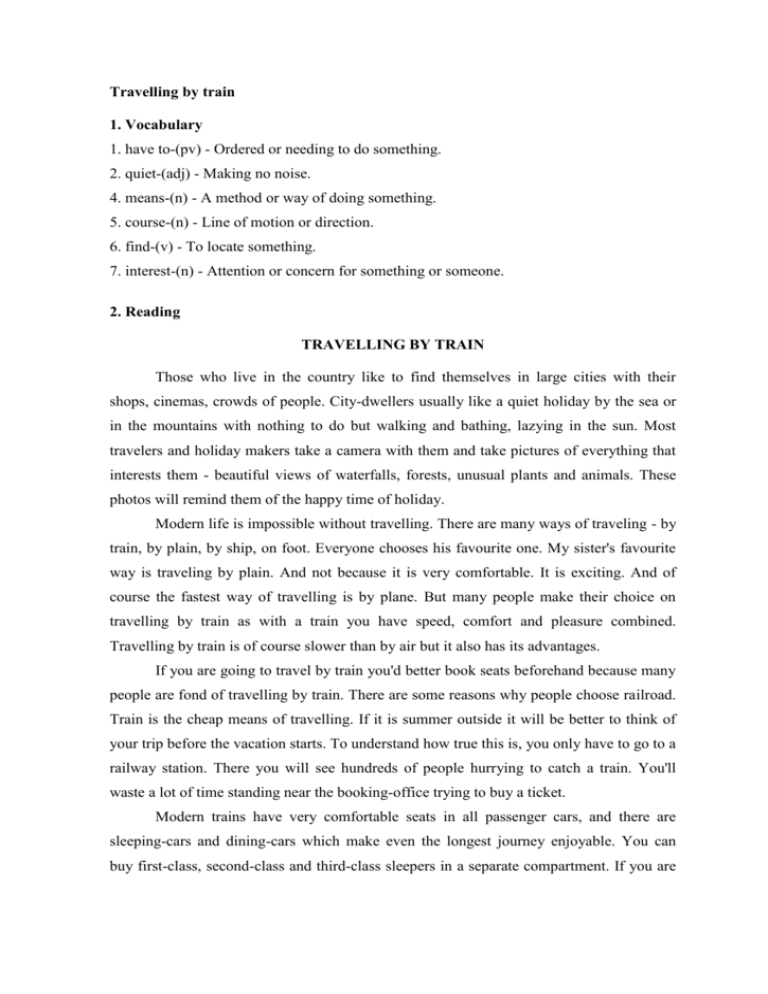
Travelling by train 1. Vocabulary 1. have to-(pv) - Ordered or needing to do something. 2. quiet-(adj) - Making no noise. 4. means-(n) - A method or way of doing something. 5. course-(n) - Line of motion or direction. 6. find-(v) - To locate something. 7. interest-(n) - Attention or concern for something or someone. 2. Reading TRAVELLING BY TRAIN Those who live in the country like to find themselves in large cities with their shops, cinemas, crowds of people. City-dwellers usually like a quiet holiday by the sea or in the mountains with nothing to do but walking and bathing, lazying in the sun. Most travelers and holiday makers take a camera with them and take pictures of everything that interests them - beautiful views of waterfalls, forests, unusual plants and animals. These photos will remind them of the happy time of holiday. Modern life is impossible without travelling. There are many ways of traveling - by train, by plain, by ship, on foot. Everyone chooses his favourite one. My sister's favourite way is traveling by plain. And not because it is very comfortable. It is exciting. And of course the fastest way of travelling is by plane. But many people make their choice on travelling by train as with a train you have speed, comfort and pleasure combined. Travelling by train is of course slower than by air but it also has its advantages. If you are going to travel by train you'd better book seats beforehand because many people are fond of travelling by train. There are some reasons why people choose railroad. Train is the cheap means of travelling. If it is summer outside it will be better to think of your trip before the vacation starts. To understand how true this is, you only have to go to a railway station. There you will see hundreds of people hurrying to catch a train. You'll waste a lot of time standing near the booking-office trying to buy a ticket. Modern trains have very comfortable seats in all passenger cars, and there are sleeping-cars and dining-cars which make even the longest journey enjoyable. You can buy first-class, second-class and third-class sleepers in a separate compartment. If you are early before the train starts you can leave your suit-cases in the compartment and walk up and down the platform. 3. Comprehension Questions 1. Write in your own words. The best journey you had. The journey you dream. _________________________________________________________________________ 4. Vocabulary 1. The ship is on a _______________________ to Spain. 2. I can't _______________________ my keys. 3. His _______________________ in cars keeps him busy on weekends. 4. The built the bridge by the quickest _______________________ possible. 5. I _______________________ leave at 4 o'clock or I will be late for my appointment. 6. When the TV is off and the children are sleeping, the house is _______________________. 7. It rained so we _______________________ cancel the tennis match. 5. Focus on Grammar A/ Identify We use adverbs of frequency to show how often something happens or it is done. The sentence "Bob always eats eggs for breakfast." describes how often Bob eats eggs. What words show how often something happens in the sentence(s) below? 1. City-dwellers usually like a quiet holiday by the sea or in the mountains with nothing to do but walking and bathing, lazying in the sun. B/Practice - Sentence Writing Write original sentences using the grammar in this exercise. 1. _________________________________________________________________________ 2. _________________________________________________________________________ Travelling by air 1. Vocabulary 1. foreign-(adj) - From another country.* 2. pleasant-(adj) - Agreeable. 3. possible-(adj) - Can be done 4. prefer-(v) - Like more.* 2. Reading TRAVELLING Modern life is impossible without travelling. Thousands of people travel every day either on business or for pleasure. They can travel by air, by rail, by sea or by road. Of course, travelling by air is the fastest and the most convenient way, but it is the most expensive too. Travelling by train is slower than by plane, but it has its advantages. You can see much more interesting places of the country you are travelling through. Modern trains have very comfortable seats. There are also sleeping cars and dining cars which make even the longest journey enjoyable. Speed, comfort and safety are the main advantages of trains and planes. That is why many people prefer them to all other means. Travelling by sea is popular mostly for pleasure trips. On board large ships and small river boats people can visit foreign countries and different places of interest within their own country. It is very pleasant to see the rise and fall of the waves, to feel the fresh sea wind blowing and hear the cry of the seagulls. Trips on the Volga, the Dnieper, the Yenisei, the Black Sea are very popular today. Many people like to travel by car. It is interesting too, because you can stop when and where you like, you do not have to buy tickets or carry your suitcases. A very popular method of travelling is hiking. It is travelling on foot. Walking tours are very interesting. Hitch-hiking is a very popular method of travelling among young people. But it is not so popular in our country as abroad. The Black Sea is one of the most wonderful places which attract holiday-makers all over the world. There are many rest-homes, sanatoriums and tourist camps there. But it is also possible to rent a room or a furnished house for a couple of weeks there. Sometimes we place ourselves in a tent on the sea shore enjoying fresh air and the sun all day long. As a rule we make new friends there. In the daytime we play volleyball, tennis, swim in the warm water of the sea and sunbathe. In the evening I like to sit on the beach watching the sea and enjoying the sunset. 3. Vocabulary 1. It is _______________________ to sail around the world. 2. I _______________________ chocolate to vanilla. 3. In New York it found 62.58 % of the population of the slum to be _______________________-born, whereas for the whole city the percentage of _______________________ers was only 43.23. - J. Riis - The Battle with the Slum 4. The weather is warm and sunny and it is a very _______________________ day. 4. Focus on Grammar A/ Identify When we show the difference between two things, we contrast describes how things are different. One word we use to contrast two things is "but". For example: "Bob likes dogs but Mary likes cats." shows the difference between what Bob likes and what Mary likes. Other ways to show difference include "however" and "even though". What things are contrasted in the sentence(s) below? 1. But it is not so popular in our country as abroad. 2. Travelling by train is slower than by plane, but it has its advantages. 3. But it is also possible to rent a room or a furnished house for a couple of weeks there. 4. Of course, travelling by air is the fastest and the most convenient way, but it is the most expensive too. B/ Practice - Sentence Writing Write original sentences using the grammar in this exercise. 1. _________________________________________________________________________ 2. _________________________________________________________________________ Business trip 1. Vocabulary 1. go on-(pv) - Continue 2. go on-(pv) - Fit on 3. arrangement-(n) - The way things are positioned or agreed upon.* 4. colleague-(n) - A coworker.* 5. competitive-(adj) - Trying to prove superiority over others.* 6. employee-(n) - A person who works for a company or another person wages or a salary. 7. expansion-(n) - Make something bigger by adding to it.* 8. expect-(v) - To think something will probably happen. 9. financial-(adj) - Related to the use of money. 10. foreign-(adj) - From another country.* 11. involve-(v) - To make someone or something a part of something else. 12. itinerary-(n) - A travel plan. 13. succeed-(v) - To accomplish what is tried. 14. preliminary-(adj) - Something before the main event.* 15. cultural-(adj) - Related to arts and/or history. 16. represent-(v) - To speak or act for another person or group. 17. improve-(v) - Make better. 18. consult-(v) - To try to get advice or information from someone or something. 19. agency-(n) - A business or government office. 20. provide-(v) - Give or supply something. 21. try -(v) - To consider and decide in court. 2. Reading BUSINESS TRIP Business trips are just part of doing business. A company tries to choose only its best people to represent it. Trips can happen in or out of the country. And there are as many reasons to go on a business as there are places to go: to sign contracts, to discuss terms of delivery, payment or shipment, to have tests, to consult, to improve one's professional skills, to provide support. Representatives of the companies involved usually make preliminary arrangements in order to meet. Whether a long-term or short-term trip, the itinerary must be carefully planned by the head of a department or another executive. After the trip, an employee is ordinarily expected to give a full financial accounting of the trip to his boss. Sightseeing, cultural events and just plain relaxing are a regular part of every business trip. And no businessman would dare forget to buy gifts for relatives, friends and colleagues while on a business trip to an interesting, new location. These trips are important because they contribute to the expansion of a company's business relationships and help that company succeed in the competitive world market. Business today is international in character, and business people often have to travel. On a business trip people might meet colleagues and business partners for the first time. Often, colleagues from different countries experience cultural difficulties, that is, they are surprised by strange, to them, social conventions in a new place. Different cultures do things differently! Management styles also differ from country to country. It is often useful when doing business in a foreign land, to get some advice from a special agency which consults on questions of international business. These days business trips are very important because face to face meetings are more valuable to profitable business than any other type of strategy. 3. Comprehension Questions 1. Research information to support a point of view. _________________________________________________________________________ 4. Vocabulary 1. Lincoln Center is a famous _______________________ center. 2. She _______________________ her company at the conference. 3. There were many _______________________ meetings before the contract was signed. 4. Our _______________________ says we have five days in London and one week in Paris. 5. If at first you don't _______________________, try and try again. 6. An umbrella _______________________ protection from the rain. 7. The judge _______________________ the murder case. 8. He called an employment _______________________ for help finding a job. 9. He studied harder to _______________________ his grades. 10. After you _______________________ the dictionary, _______________________ the teacher. 11. Please don't _______________________ me in your argument. you should 12. That is Sherlock Holmes, and the man with him is his _______________________ Dr. Watson. 13. Baseball is a _______________________ sport. 14. I have an _______________________ at work to leave early on Fridays. 15. The party _______________________ after I left. 16. The top _______________________ the bottle. 17. My father's _______________________ advice was to save as much as you spend. 18. In New York it found 62.58 % of the population of the slum to be _______________________-born, whereas for the whole city the percentage of _______________________ers was only 43.23. - J. Riis - The Battle with the Slum 19. We _______________________ the plane to land in one hour. 20. The company needs more _______________________s to grow. 21. The _______________________ of the empire caused many wars. 5. Focus on Grammar A/ Identify Notice the difference between the sentences "Carol washed the car" and "The car was washed by Carol". The first sentence is about Carol; Carol is the subject and the verb is "washed", the simple past tense. The second sentence is about the car, the car is the subject and the verb phrase is "was washed", the passive voice in the past tense. What is the subject of the sentence(s) below? 1. Whether a long-term or short-term trip, the itinerary must be carefully planned by the head of a department or another executive. 2. After the trip, an employee is ordinarily expected to give a full financial accounting of the trip to his boss. 3. Often, colleagues from different countries experience cultural difficulties, that is, they are surprised by strange, to them, social conventions in a new place. B/ Practice - Sentence Writing Write original sentences using the grammar in this exercise. 1. ___________________________________________________________________ Travelling by car 1. Vocabulary 1. get into-(pv) - Enter a car 2. get into-(pv) - Become interested in 3. go for-(pv) - Try to, try for. 4. alcohol-(n) - A flammable, intoxicating liquid.* 5. complicate-(v) - To make something difficult, or hard to deal with. 6. immature-(adj) - Not full-grown. 7. irresponsible-(adj) - Careless of or unable to meet responsibilities. 8. available-(adj) - Ready, accessible. 9. patience-(n) - The ability to wait calmly and not feel in a hurry or rushed. 10. find-(v) - To locate something. 11. sensible-(adj) - Reasonable, logical. (old fashioned: aware of something by seeing, hearing, touching, smelling, or tasting.) 2. Reading TRAVELLING BY CAR There are many different means of transport. Sometimes we can't imagine how people could live without cars, buses, trains and planes many years ago. Some people prefer travelling by car, others think that it is dangerous and pollutes the environment. Whatever your views, there's no doubt that travelling by car has both many advantages, and a lot of disadvantages. The advantages and disadvantages of travelling by car: we have a lot of opportunities to go any time we like. Secondly, cars are always available and we can go by car everywhere. There is no bus traffic in some small villages. People have to wait for a long time to go to the town. Moreover, we can also have touring holiday when and where we want. If we want to go for a trip, we don't have to book bus tickets- it is too complicated. If we have a car, we need only a map or GPS system and we can simply get into a car and go! On the other hand, travelling by car is not very comfortable for a driver. He cannot relax; he has to be careful all the time. Vehicles are forced to stay in traffic jams, it is also very uncomfortable. Passengers can sleep or doing what they want. When driver is very tired, he can be as dangerous on the road as drunk driver. Travelling by car is dangerous, too. There are many crashes on the roads and we should be very careful and sensible. There are many people, who want to drive after alcohol, they cause a lot of accidents. In my opinion they are irresponsible and immature and people who drink and drive should lose their driving license for life. Using a car is also very expensive. If you have a car you have to pay much money for petrol and services. Petrol prices are very high. In my opinion people should use gas more than petrol because gas is better for the environment. What is more, the gas is cheaper. To sum up, if we have money and remember about politeness, patience and responsible driving even when we have problems with finding a parking space and we get nervous- we can enjoy driving for many years, for sure. 3. Comprehension Questions 1. Write in your own words. Advantages and disadvantages of travelling by car. ______________________________________________________________________ 2. How many different means of transport do you know? ______________________________________________________________________ 4.Vocabulary 1. The hotel has rooms _______________________ that week. 2. The _______________________ girl was always late and never completed her homework. 3. It takes a lot of _______________________ to be a kindergarten teacher. 4. Going to school is a _______________________ decision. 5. I can't _______________________ my keys. 6. That tree is still _______________________; in 20 years it will be much bigger. 7. Quick! Get into the car! 8. When did you _______________________ snowboarding? 9. I have decided to _______________________ the new job at the computer center. 10. Having children _______________________ his life. 11. They were quite unsteady when they came out, owing to the effect of the _______________________ on their empty stomachs. - Maupassant - Two Friends 5. Focus on Grammar A/ Identify The "ing" form of a verb can be used as a noun. These are called gerunds. Sometimes gerunds are used as the object of a verb. For example, in the sentence "I like sleeping," the gerund "sleeping" is the object of the verb "like." Find the gerunds in the sentence(s) below. 1. Moreover, we can also have touring holiday when and where we want. 2. Some people prefer travelling by car, others think that it is dangerous and pollutes the environment. 3. To sum up, if we have money and remember about politeness, patience and responsible driving even when we have problems with finding a parking space and we get nervous- we can enjoy driving for many years, for sure. B/Practice - Sentence Writing Write original sentences using the grammar in this exercise. 1. ______________________________________________________________________ 2. ______________________________________________________________________
